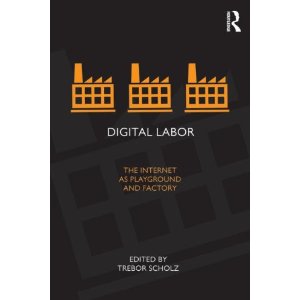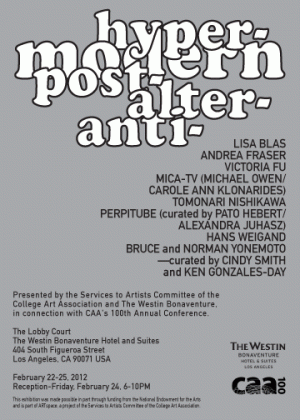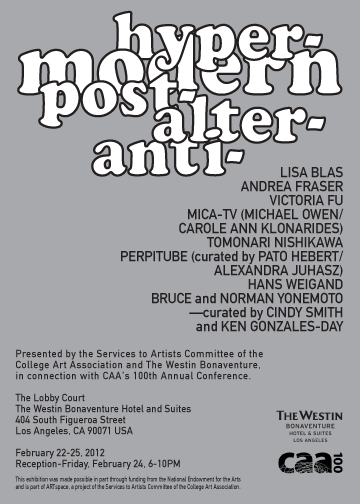Posts from the ‘digital media news’ Category
 Digital Labor: The Internet as Playground and Factory
Digital Labor: The Internet as Playground and Factory
Edited by Trebor Scholz
Digital Labor asks whether life on the internet is mostly work, or play. We tweet, we tag photos, we link, we review books, we comment on blogs, we remix media, and we upload video to create much of the content that makes up the web. And large corporations profit on our online activity by tracking our interests, affiliations, and habits—and then collecting and selling the data. What is the nature of this interactive ‘labor’ and the new forms of digital sociality that it brings into being? The international, interdisciplinary contributors to Digital Labor suggest that there is no longer a clear divide between ‘the personal’ and ‘work,’ as every aspect of life drives the digital economy: sexual desire, boredom, friendship—and all become fodder for speculative profit. They argue that we are living in a total labor society and the way in which we are commoditized, racialized, and engendered is profoundly and disturbingly normalized by the dominant discourse of digital culture. Digital Labor poses a series of questions about our digital present: How is the global crisis of capitalism linked to the hidden labor of the digital economy? How do we address that most online interaction, whether work or play, for profit or not, is taking place on corporate platforms? How can we acknowledge moments of exploitation while not eradicating optimism, inspiration, and the many instances of individual financial and political empowerment? In response to these questions, this collection offers new definitions of digital labor that address and challenge the complex, hybrid realities of the digital economy.
Introduction: Trebor Scholz Why Does Digital Labor Matter Now? I. The Shifting Sites of Labor Markets
1. Andrew Ross On the Digital Labor Question
2. Tiziana Terranova Free Labor
3. Sean Cubitt The Political Economy of Cosmopolis
4. McKenzie Wark Considerations on A Hacker Manifesto II. Interrogating Modes of Digital Labor
5. Ayhan Aytes Return of The Crowds: Mechanical Turk and Neoliberal States of Exception
6. Abigail De Kosnik Fandom as Free Labor
7. Patricia Clough The Digital, Labor and Measure Beyond Biopolitics
8. Jodi Dean Whatever Blogging III. The Violence of Participation
9. Mark Andrejevic Estranged Free Labor
10. Jonathan Beller Digitality and The Media of Dispossession
11. Lisa Nakamura Don’t Hate the Player, Hate the Game: The Racialization of Labor in World of Warcraft IV. Organizing Networks in an Age of Vulnerable Publics
12. Michel Bauwens Thesis on Digital Labor in an Emerging P2P Economy
13. Christian Fuchs Class and Exploitation on the Internet
14. Ned Rossitter and Soenke Zehle Acts of Translation: Organizing Networks as Algorithmic Technologies of the Common
LACE presents Now he’s out in public and everyone can see, a new 18 channel video installation by artist Natalie Bookchin on view 8 March – 15 April, 2012.
Now he’s out in public and everyone can see weaves together found fragments from online video diaries in which vloggers recount a series of media scandals involving African American men. The multiple stories, originally circulated and enflamed by networks of corporate media gone viral, intersect around themes of racial and class identity and explore popular attitudes, anxieties, and conflicts about race. Bookchin’s work creates a critical context for otherwise isolated and scatter-shot online voices, drawing links, making connections, and locating tropes between individual rants and responses. Where the typical viewer of online video is a single person in front of her screen, the installation produces an active social space where multiple viewers navigate through a media environment, piecing together a fragmented and layered narrative told across space and time.
A major new work by Bookchin, Now he’s out in public and everyone can see was developed over the past two and a half years and is part of a larger body of work in which Bookchin repurposes videos made and circulated online, giving new social shape and form to individual expression. This newest project is spatially and conceptually complex, weaving together many more videos, sounds, voices, narratives, and perspectives into three-dimensional space. This further evolution of form reflects and explores the mix of struggles, conflicts, and harmony in some of the critical stories we as a society are telling today about who we are, and what we aspire to be, and represents a significant step in Bookchin’s practice.
—
Our recent guest, artist Natalie Bookchin, will present a new work called “He’s Out in Public” at LACE in Hollywood. Bookchin uses the massive archive of self-expressive texts on youtube, vimeo, and other social video networking sites to render dynamic orchestrations of sociability and networked expression, exploring the problematics and possibilities of baroque public intimacy. Here are the details about the show and a link to the website with more information about the project:
Opening reception: Thursday, March 8 8-10pm . Show runs March 8 to April 15 .
LACE is located at 6522 Hollywood Blvd. Los Angeles, CA 90028 . phone 323.957.1777
More details about “He’s Out in Public”
Last week Apple announced a free download of its “book authoring” software for iBooks, “iBook Author” – the PR is at
http://www.apple.com/ibooks-author/
iBook Author appears to be an updated, more graphical and better integrated version of the free app authoring software tools for developers Apple has offered for a couple of years now, but that haven’t yet been well suited for more general users. It requires OSX 10.6.8, to which many Mac computers older than 5 or 6 years can’t be upgraded (if you have a Core Duo instead of a Core 2 Duo, for instance, you’re out of luck). Reviews are early and tentative and not worth linking to here as yet. But according to one report, the iBook Author format is proprietary instead of aimed at supporting open authoring of “digital book” formats, so the usual complaints are already flowing.
http://www.zdnet.com/blog/bott/how-apple-is-sabotaging-an-open-standard-for-digital-books/4378
Generally, if you want to take full advantage of proprietary features of a specific hardware/software platform, you’re likely to have a problem meeting “open” compatibility standards to some meaningful degree. So that complaint is hardly surprising.
But the pitch Apple is making is not to pre-empt open standards for “digital books” (yuck!) per se, and rather to prime educational multimedia publishing with better support for (of course) iPad-oriented educational multimedia (shades of Hypercard!), for educational markets. I’ll be upgrading to a new laptop soon (yes, my MacBook is that old!) and will be checking the software out soon. I’ll keep you posted.





